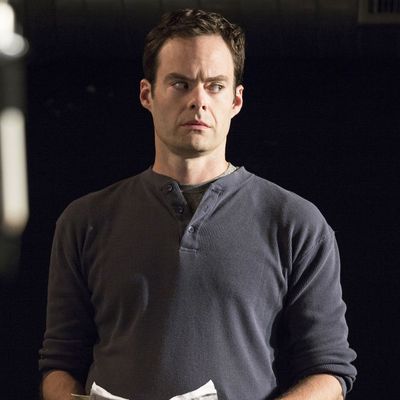
Barry has two different series embedded inside it. One is a crime drama about a former Marine who becomes a hit man — that would be Barry Berkman (Bill Hader) — and reluctantly continues to carry out killings based on orders from his longtime boss Fuches (Stephen Root). The other is a comedy in which Barry stumbles into a Los Angeles acting class, decides to pursue the craft, and gets romantically involved with narcissistic wannabe thespian Sally Reed (Sarah Goldberg).
The whole half-hour package, debuting next Sunday on HBO, is like a mash-up of Breaking Bad and Love, but honestly, even that doesn’t quite capture the vibe. Co-created by Hader and Silicon Valley producer Alec Berg, Barry is its own tonally shifting TV organism, one that contains brutal violence, fantasy sequences, unexpected twists, and sly Hollywood references. (At one point, Sally is totally hyped about an audition for a TV adaptation of We Bought a Zoo.)
Braiding these two genres together — which happens after a hit job gone awry lures Barry into the acting class, and eventually drags its participants into a police investigation — isn’t entirely as random as it sounds. The toggling between the two speaks to the dual identities that are central to Barry’s life, whether he’s snuffing out shady guys or trying to perform a scene from Shakespeare. The contrast also provides amusing visual juxtapositions throughout the first season’s eight episodes, including one extended sequence in which Barry chats on the phone about scene work while Chechen mobsters beat the hell out of Fuches in the background. Barry’s acting friends treat everything like it’s life and death, but they have no idea what life and death really looks like. Perhaps that’s why Barry wants to spend so much time around them.
It’s certainly not because he’s such a natural onstage. Barry’s default setting is total emotional detachment. His teacher, Gene Cousineau (Henry Winkler, having the time of his life as an egocentric, brutal coach) struggles to draw basic humanity out of him. “Pick your favorite soup!” Gene commands during an improv session. “I just like broth,” Barry says.
Plain broth is a good description for Barry’s personality early in the season, which makes it challenging at first to invest in what happens to him. Stick with it, though. Hader, best known for his comedic skills, has shown off his dramatic range before in films like The Skeleton Twins, but he’s the best he’s ever been here. Even when his energy is deliberately running on a low battery, we can see that the wheels in his mind are still turning. His determination to underplay certain moments only makes the inevitable uncorking of Barry’s pent-up emotions that much more powerful when it comes.
Hader also gets to direct a few episodes, and along with the other filmmakers this season — including Maggie Carey, Atlanta’s Hiro Murai, and Berg — brings a sense of command and fluidity to a series that could have felt much more unsettled in other hands.
The rest of the cast is strong, too. Goldberg makes flaky, self-absorbed Sally someone we can sympathize with, Root conveys Fuches’s single-minded desire to keep Barry’s hit list alive with just the right amount of loopiness, and as the mafia deputy Noho Hank, Anthony Carrigan is a hilariously polite bundle of non sequiturs. (“You know the song ‘Fly Like an Eagle’ by Seal from the Space Jam soundtrack?” he asks, with the sincere belief that the song originated with Michael Jordan and Bugs Bunny.)
Barry features several dream sequences, most of them centered around Barry’s fantasies about a happy Hollywood future with Sally by his side. At first, they seem out of place and a little distracting, but over time, they serve as evidence of Barry’s blurred view of his colliding worlds, and as hints that his PTSD has lingered longer than we thought. The final act, in particular, may make audiences wonder whether what they’re seeing is real or the product of an addled mind.
“We all act in our everyday lives,” Gene writes in an advice book that Barry treats like a Bible, even reading it while he’s staking out his next victim. Barry certainly acts every day, so much so that we can’t be sure he’s really being himself, even at the very end.


